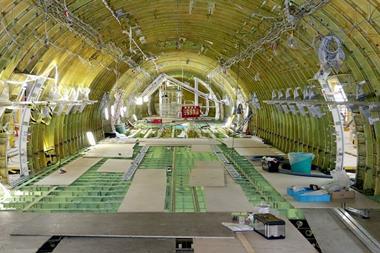Canadian cargo airline and lessor Cargojet has decided to ditch all plans to convert Boeing 777s into freighters in a bid to safeguard its business against continuing soft air cargo demand.
The freighter operator has decided it will no longer convert four Boeing 777-200s into freighters, leaving it with no current 777F options.
This decision, announced in a January 15 fleet update, is a major step away from its original plans to convert eight 777s (four -200s and four -300s) that were still in place this time last year.
The freighter operator will instead focus on its Boeing 767F aircraft, but has retained the rights for future 777 conversions.
“Throughout 2023 we exercised caution in deploying growth capital given the softer economic conditions” said Cargojet executive chairman Ajay Virmani. “Forecasts continue to indicate that the international air cargo market will remain soft in the short to medium term and deploying 777s into the market would not be strategically prudent.
"We have decided to exit our commitments for the four remaining 777 aircraft, while continuing to flex our 767 fleet to accommodate our organic growth strategy.
“Cargojet has substantially completed the operational groundwork to be able to enter the 777 market should economic conditions change. Cargojet has also retained the rights to provide the optionality for future conversion slots."
The move isn't entirely a surprise. In March last year, the freighter operator decided to scale back its plans for the conversion of eight 777Fs in favour of just four conversions.
Plans for these conversions had been announced during the pandemic boom period of high demand for cargo.
It was February 2021 when Cargojet announced it had plans to enter the 777 freighter market.
Then in November 2021, Cargojet became the launch customer for Mammoth Freighters’ 777-200LR freighter conversion programme, signing up for two B777-200LRMF freighters, with options for two -300ERMFs and two additional -200LRMFs.
The following May, Cargojet confirmed it had signed agreements for the purchase and conversion of four 777-200 conversions, earmarked to be deployed as part of a strategic agreement with DHL, plus agreements for the purchase and conversion of four B777-300 aircraft.
That same month Cargojet said that Israel Aerospace Industries (IAI) would carry out passenger-to-freighter (P2F) conversions of the 777-300ER aircraft.
Things started to unravel in November 2022 with the delay of one of the 777-300 conversions as part of Cargojet's efforts to manage costs in the face of a market slowdown.
And by March 2023 the carrier announced it had dropped plans to convert the four 777-300s.
The airline continued to focus on cost reduction throughout last year as its revenues declined.
In addition to its 777 turnabout, Cargojet also noted in this week's statement that it has four surplus B757 freighters and will potentially dry lease or sell these aircraft.
The airline does retain some optimism for the future though. "Cargojet currently owns the feedstock for two 767’s and plans to convert them as the demand begins to recover over the next couple of years," said the carrier.
"Management believes that the current fleet plan will be sufficient to meet its short to medium-term objectives and Cargojet is well positioned to scale up operations as the economic cycle returns to growth."
Cargojet is not the only freighter operator to get cold feet in the current economic climate.
US freighter operator Amerijet recently announced it has returned six 757Fs to lessors in favour of operating an all-767 fleet, following market challenges last year.
There are mixed opinions about how air cargo demand will fare this year.
IATA is expecting air cargo demand to increase by 4.5% this year, though it said pressure on rates is expected to bring down revenues for the sector.
Rates are expected to continue to decline this year compared with 2023 levels, according to Bruce Chan, director and senior research analyst at investment bank Stifel.
And Xeneta said global airfreight capacity will likely continue to outpace market demand.
Meanwhile. the latest Cirium Fleet Forecast predicts that the global freighter fleet will grow by 2.6% annually and 3,590 freighter aircraft will be supplied over the next 20 years.
https://www.aircargonews.net/airlines/freighter-operator/cargojet-delays-b777f-delivery/














